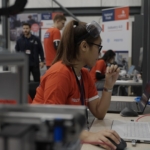Last week I touched on the reforms that the Government is rolling out in England: the 3m apprenticeship target, levy, T-levels and IOTs are all very familiar to us and, in the case of the latter two, will become increasingly so in the months ahead. What is perhaps less well understood is the wider context for the reform agenda and why Education Secretary Justine Greening is calling for a skills revolution. A really interesting study that has just been published by the Department for Education (DfE) helps offer this essential context.
Professor David Greatbatch was commissioned to look at the funding provision and wider set-up of post-16 education in European countries comparable to England. Denmark, France, Germany, the Netherlands and Norway were the countries selected. His findings show that in each country investment in post-16 technical education is increasing, often substantially, and that more is being spent on technical routes than academic routes. Moreover, in each country the study suggests additional funding will be needed in the years ahead to ‘attract high performing students; improve recruitment and retention; streamline and improve the transparency of [technical] pathways; and ensure that upper secondary [technical education] is continuously adapted to meet evolving skills needs and changes in the labour market’. I’d suggest that these findings are a wake-up call to all of us in the UK about the importance of the skills revolution and why it matters.
You can’t wish for higher quality skills, you have to invest in them. This is why WorldSkills UK has supported the apprenticeship levy from its conception. The levy can bring the investment which is urgently needed in light of our key domestic economic challenges: improving productivity and international competitiveness. It’s the international dimension, however, which is brought to light by the DfE study: countries with which we will be increasingly competitive for investment and trade following Brexit, are making the decisions today which will have long-term consequences for their young people’s futures. If we want to make an economic success of Brexit, we have to keep an eye on what our competitors are doing. Post-16 technical education in the UK has traditionally been seen as the ‘poor relation’ of the academic route. That’s why it’s marked that countries like France and Germany actually spend more on the technical than the academic route.
It’s another reason we can continue to be proud of Team UK at the most recent WorldSkills competition in Sao Paulo 2015: the team finished ahead of the French and Germans against all the odds. Thirty-four young people from England, N.Ireland, Scotland and Wales are going out to WorldSkills Abu Dhabi in October and all their training and preparation will be going into following in the illustrious footsteps of our team from São Paulo. Our skills system has to ensure that they have the same chance to succeed as their Norwegian, Dutch and Danish peers. Brexit means that ‘competition’ will be an increasingly real concept for us all. As the UK, we’ll need to show that it’s British skills that are worth investing in; and make no mistake, the competition for investment will be intense.
WorldSkills UK is built on the principle of competition so we’re uniquely placed to contribute here. And investment in skills will go hand in hand with attracting more young people into technical career routes. I was at the Mayor of London’s Skills for Londoners apprenticeships taskforce meeting in City Hall recently and everyone could see the potential of our peer-to-peer model of careers advice – taking young people into schools who’ve achieved success through skills competitions and having them talk to other young people thinking about apprenticeships and technical careers. I will be having further discussions in the coming weeks about how this can be extended further in London. We want to extend it across the UK too as we think it’s the most powerful way to get our young people thinking about career options. Let’s make ourselves a world-leader in peer-to-peer careers advice and set a benchmark for major international countries to measure themselves against. After all, as the athletes competing at the World Athletics Championships that London is currently proudly playing host to will attest, this is what competition is all about.


